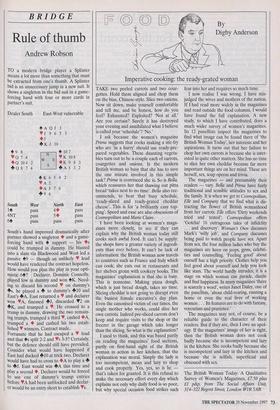Imperative cooking: the ready-grated woman
TAKE two peeled carrots and two cour- gettes. Hold them aligned and chop them on the bias, Chinese-style. Slice two onions. Now sit down, make yourself comfortable and tell me, and be honest, how do you feel? Exhausted? Exploited? 'Not at all.' Are you certain? Surely it has destroyed your evening and annihilated what I believe is called your 'schedule'? 'No.'
I ask because the women's magazine Prima suggests that cooks making a stir-fry who are 'in a hurry' should use ready-pre- pared vegetables. These daunting vegeta- bles turn out to be a couple each of carrots, courgettes and onions. Is the modern British woman so busy that she has to save the one minute involved in this simple task? Prima is convinced she is. So is Bella, which reassures her that thawing out pitta bread 'takes next to no time'. Bella also rec- ommends, to beat that busy schedule, `ready-sliced and ready-grated cheddar cheese'. This is for 'a brilliantly easy top- ping'. Speed and ease are also obsessions of Cosmopolitan and Marie Claire.
' I have been looking at women's maga- zines more closely, to see if they can explain why the British woman today still cooks such awful food. It can't be supply: the shops have a greater variety of ingredi- ents than ever before. It can't be lack of information: the British woman now travels to countries such as France and Italy which can cook; she eats out in restaurants and her shelves groan with cookery books. The magazines' explanation is that she is busy. This is nonsense. Making pizza dough, which is just bread dough, takes no time. Slicing cheddar is not going to disrupt even the busiest female executive's day plan. Even the canonised victim of our times, the single mother who works, could slice her own carrots. Indeed pre-sliced carrots don't keep and require visits to the shop or the freezer in the garage which take longer than the slicing. So what is the explanation?
I used to think, and this was based partly on reading the magazines' food sections, partly on first-hand sight of the British woman in action in her kitchen, that the explanation was moral. Simply the lady is too incompetent, mean and lazy to shop and cook properly. Yes, yes, so is he that's taken for granted. It is this refusal to make the necessary effort every day which explains not only why daily food is so poor, but why special occasion food strikes such fear into her and requires so much time.
I now realise I was wrong. I have mis- judged the wives and mothers of the nation. If I had read more widely in the magazines and read outside the food columns, I would have found the full explanation. A new study, to which I have contributed, does a much wider survey of women's magazines. Its 12 panellists inspect the magazines to find what image can be found there of 'the British Woman Today', her interests and her aspirations. It turns out that her failure to chop her own carrots is because she is inter- ested in quite other matters. She has no time to slice her own cheddar because far more important things are on her mind. These are herself, sex, soap operas and trivia.
The magazines — and presumably their readers — vary. Bella and Prima have fairly traditional and sensible attitudes to sex and the family. It is when we get to Cosmopolitan, Elle and Company that we find what is dis- tracting the flower of British womanhood from her carrots. Elle offers 'Dirty weekends tried and tested'; Cosmopolitan offers `Gotchal 16 putrageous tales of infidelity . and discovery'. Woman's Own discusses Mark's *illy job', and Company discusses being paid to watch people have sex. Apart from sex, the four million ladies who buy the magazines are keen on jeeps, gyms, celebri- ties and counselling. 'Feeling good' about oneself has a high priority. Clothes help you feel good about yourself and help you look like stars. The world hardly intrudes; it is a stage on which woman can parade, da77le and find happiness. In many magazines 'there is scarcely a word', writes Janet Daley, one of the panellists, 'about child-rearing, running a home or even the real lives of working women . . . Its features are to do with fantasy, voyeurism and prurience.' The magazines may not, of course, be a reliable guide to the character of their readers. But if they are, then I owe an apol- ogy. If the magazines' image of her is right, then the British woman does not cook badly because she is incompetent and lazy in the kitchen. She cooks badly because she is incompetent and lazy in the kitchen and because she is selfish, superficial and obsessed with sex.


















































































 Previous page
Previous page